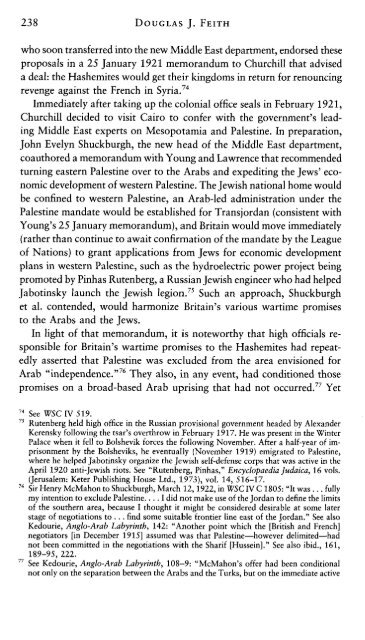Churchill, Palestine and Zionism, 1904-1922 - Douglas J. Feith
Churchill, Palestine and Zionism, 1904-1922 - Douglas J. Feith
Churchill, Palestine and Zionism, 1904-1922 - Douglas J. Feith
You also want an ePaper? Increase the reach of your titles
YUMPU automatically turns print PDFs into web optimized ePapers that Google loves.
238 DOUGLAS J. FEITH<br />
who soon transferred into the new Middle East department, endorsed these<br />
proposals in a 25 January 1921 memor<strong>and</strong>um to <strong>Churchill</strong> that advised<br />
a deal: the Hashemites would get their kingdoms in return for renouncing<br />
revenge against the French in Syria. 74<br />
Immediately after taking up the colonial office seals in February 1921,<br />
<strong>Churchill</strong> decided to visit Cairo to confer with the government's leading<br />
Middle East experts on Mesopotamia <strong>and</strong> <strong>Palestine</strong>. In preparation,<br />
John Evelyn Shuck burgh, the new head of the Middle East department,<br />
coauthored a memor<strong>and</strong>um with Young <strong>and</strong> Lawrence that recommended<br />
turning eastern <strong>Palestine</strong> over to the Arabs <strong>and</strong> expediting the Jews' economic<br />
development of western <strong>Palestine</strong>. The Jewish national home would<br />
be confined to western <strong>Palestine</strong>, an Arab-led administration under the<br />
<strong>Palestine</strong> m<strong>and</strong>ate would be established for Transjordan (consistent with<br />
Young's 25 January memor<strong>and</strong>um), <strong>and</strong> Britain would move immediately<br />
(rather than continue to await confirmation of the m<strong>and</strong>ate by the League<br />
of Nations) to grant applications from Jews for economic development<br />
plans in western <strong>Palestine</strong>, such as the hydroelectric power project being<br />
promoted by Pinhas Rutenberg, a Russian Jewish engineer who had helped<br />
Jabotinsky launch the Jewish legion?5 Such an approach, Shuck burgh<br />
et a1. contended, would harmonize Britain's various wartime promises<br />
to the Arabs <strong>and</strong> the Jews.<br />
In light of that memor<strong>and</strong>um, it is noteworthy that high officials responsible<br />
for Britain's wartime promises to the Hashemites had repeatedly<br />
asserted that <strong>Palestine</strong> was excluded from the area envisioned for<br />
Arab "independence.,,76 They also, in any event, had conditioned those<br />
promises on a broad-based Arab uprising that had not occurred. 77 who soon transferred into the new Middle East department, endorsed these<br />
proposals in a 25 January 1921 memor<strong>and</strong>um to <strong>Churchill</strong> that advised<br />
a deal: the Hashemites would get their kingdoms in return for renouncing<br />
revenge against the French in Syria. 74<br />
Immediately after taking up the colonial office seals in February 1921,<br />
<strong>Churchill</strong> decided to visit Cairo to confer with the government's leading<br />
Middle East experts on Mesopotamia <strong>and</strong> <strong>Palestine</strong>. In preparation,<br />
John Evelyn Shuck burgh, the new head of the Middle East department,<br />
coauthored a memor<strong>and</strong>um with Young <strong>and</strong> Lawrence that recommended<br />
turning eastern <strong>Palestine</strong> over to the Arabs <strong>and</strong> expediting the Jews' economic<br />
development of western <strong>Palestine</strong>. The Jewish national home would<br />
be confined to western <strong>Palestine</strong>, an Arab-led administration under the<br />
<strong>Palestine</strong> m<strong>and</strong>ate would be established for Transjordan (consistent with<br />
Young's 25 January memor<strong>and</strong>um), <strong>and</strong> Britain would move immediately<br />
(rather than continue to await confirmation of the m<strong>and</strong>ate by the League<br />
of Nations) to grant applications from Jews for economic development<br />
plans in western <strong>Palestine</strong>, such as the hydroelectric power project being<br />
promoted by Pinhas Rutenberg, a Russian Jewish engineer who had helped<br />
Jabotinsky launch the Jewish legion?5 Such an approach, Shuck burgh<br />
et a1. contended, would harmonize Britain's various wartime promises<br />
to the Arabs <strong>and</strong> the Jews.<br />
In light of that memor<strong>and</strong>um, it is noteworthy that high officials responsible<br />
for Britain's wartime promises to the Hashemites had repeatedly<br />
asserted that <strong>Palestine</strong> was excluded from the area envisioned for<br />
Arab "independence.,,76 They also, in any event, had conditioned those<br />
promises on a broad-based Arab uprising that had not occurred. Yet<br />
77 Yet<br />
74 See WSC IV 519.<br />
75 Rutenberg held high office in the Russian provisional government headed by Alex<strong>and</strong>er<br />
Kerensky following the tsar's overthrow in February 1917. He was present in the Winter<br />
Palace when it fell to Bolshevik forces the following November. After a half-year of imprisonment<br />
by the Bolsheviks, he eventually (November 1919) emigrated to <strong>Palestine</strong>,<br />
where he helped Jabotinsky organize the Jewish self-defense corps that was active in the<br />
April 1920 anti-Jewish riots. See "Rutenberg, Pinhas," Encyclopaedia Judaica, 16 vols.<br />
(Jerusalem: Keter Publishing House Ltd., 1973), vol. 14,516-17.<br />
76 Sir Henry McMahon to Shuckburgh, March 12,<strong>1922</strong>, in WSC IV C 1805: "It was ... fully<br />
my intention to exclude <strong>Palestine</strong> .... I did not make use of the Jordan to define the limits<br />
of the southern area, because I thought it might be considered desirable at some later<br />
stage of negotiations to ... find some suitable frontier line east of the Jordan." See also<br />
Kedourie, Anglo-Arab Labyrinth, 142: "Another point which the [British <strong>and</strong> French]<br />
negotiators [in December 1915] assumed was that <strong>Palestine</strong>-however delimited-had<br />
not been committed in the negotiations with the Sharif [Hussein]." See also ibid., 161,<br />
189-95,222.<br />
77 See Kedourie, Anglo-Arab Labyrinth, 108-9: "McMahon's offer had been conditional<br />
not only on the separation between the Arabs <strong>and</strong> the Turks, but on the immediate active


